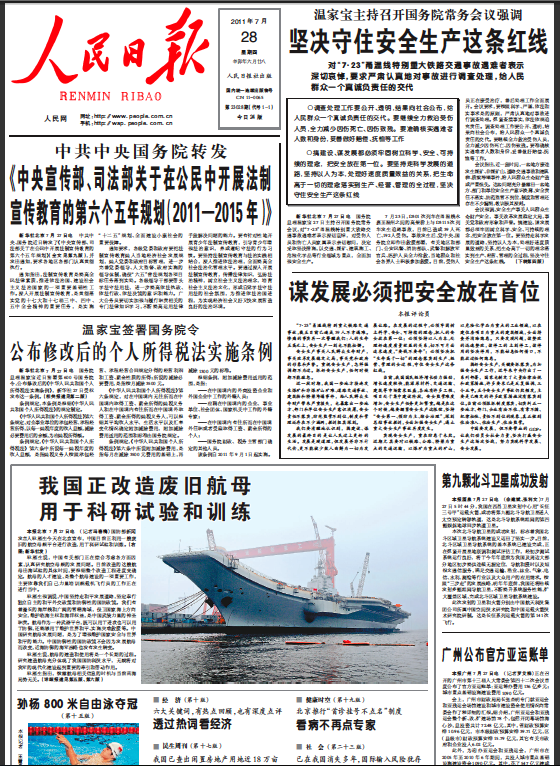In the midst of the ongoing crisis surrounding the July 23 train collision in Wenzhou, the Party’s official People’s Daily newspaper ran an editorial on its front page yesterday calling for more vigilance on the issue of “production safety.” The editorial said that while development must be a priority for China, “we do not want a GDP that comes with blood.”
The editorial raised some eyebrows both inside and outside China, but it should be remarked that the editorial does not mark a major departure. With the exception of the phrasing about “bloody GDP,” the piece offers little in the way of original ideas or approaches.

[ABOVE: The front-page editorial on “bloody GDP” in yesterday’s edition of the People’s Daily, at right, just above the photograph of China’s new (recycled) aircraft carrier.]
The piece turns the finger of blame on “various local governments, agencies and companies” and says that “responsibility has not been implemented.” But responsibility is not, in the first place, something that can be “implemented.” It has to be enforced through meaningful reforms that allow for accountability. And whatever the political tensions behind the Party curtain, the central leadership remains culpable for not pushing harder on the essential issue of political reform.
I’ve had my say on this issue here. And on that note, I’ll turn to our partial translation of the People’s Daily editorial.
In Seeking Development, Safety Must Be Put First
People’s Daily
July 28, 2011
Up to now, 39 people have already died in the major “July 23” railway disaster in Wenzhou. These painful facts once again send a warning to us: nothing is more paramount than human life, and we cannot relax for one moment in seeking safety in production (安全生产).
China must develop, but we do not want a GDP that comes with blood. Let us mobilize all forces in society, resolutely pushing for victory in the war for safety in production, working hard to realize scientific development and safe development.
Safe production is an asset that concerns the lives of the people, that concerns the overall picture of reform, development and stability, that concerns the image and prestige of the Party and government. Prioritizing safe production is something that cannot be overemphasized. Grasping safe production is something we cannot neglect at any time.
In the recent period, a number of local areas have suffered a string of coal mine accidents and accidents at other non-coal mines, [major] traffic accidents, collapses of buildings and bridges, resulting in substantial loss of life and property for the people and at the same time exposing a weak consciousness of production safety among certain local governments, agencies and companies. Responsibility for safety has not been implemented, supervision and control have been inadequate, and there are still many gaps in systems and management. The lessons to be drawn are profound.
We must recognize clearly that the ultimate goal in seeking construction and development is to allow people to live good lives. Development is the overriding priority, but in seeking development we cannot fail to calculate the costs. Even less can we allow this [principle] to be twisted by a few into the idea that anything and everything can be set aside for the sake of development. In the process of development, we must secure the concepts of science, safety and sustainability, putting the safety of people in the first position; We must adhere to [the principle of] people first (以人为本), managing the relationship between speed, quality and efficiency well. We cannot superficially seek speed alone, “pursuing money but not seeking life”; We must resolutely establish the principle of “life above all else” through the entire process of production, business and management, holding the red line of production safety.




















